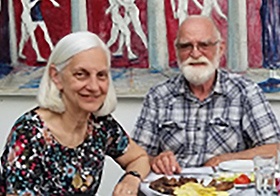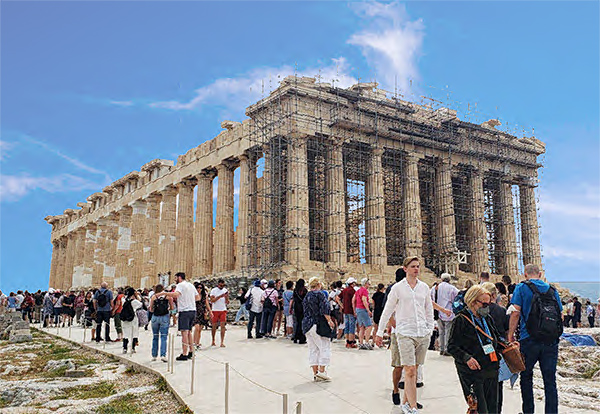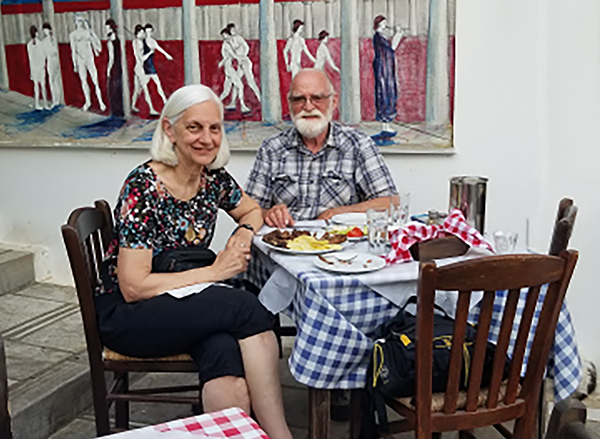 By Karl Kosek & Emily Glasier
By Karl Kosek & Emily Glasier
In late May/early June we spent a lovely vacation in Greece -- originally scheduled for 2020, then postponed to 2021 because of the pandemic, and finally we did it in 2022!
Karl began the journey: he chartered a 50-foot boat with five buddies and sailed the islands for nine days. Then Emily met Karl and we traveled for 2+ weeks (by rental car, ferry, on foot, and even in a few taxis). We visited many interesting sights. More important, the people we met were very friendly, the food was delicious, and the weather was perfect (sunny every day, in the 70's and 80's).
 First, we spent a couple of days in Athens, a bustling, cosmopolitan city of 3 million people (almost a third of the 11 million people who live in Greece). We stayed in a centrally located hostel in the Plaka neighborhood in the shadow of the Acropolis wher1 `e we enjoyed a private room and bath. We enjoyed walking the narrow cobblestone streets of the area which feels more like a hillside village than a city center, took a city bus tour, happened on the opening of a gallery exhibit of interesting metal sculptures, and of course, visited several museums.
First, we spent a couple of days in Athens, a bustling, cosmopolitan city of 3 million people (almost a third of the 11 million people who live in Greece). We stayed in a centrally located hostel in the Plaka neighborhood in the shadow of the Acropolis wher1 `e we enjoyed a private room and bath. We enjoyed walking the narrow cobblestone streets of the area which feels more like a hillside village than a city center, took a city bus tour, happened on the opening of a gallery exhibit of interesting metal sculptures, and of course, visited several museums.
Then we spent a couple of days on the large island of Evia (population 200,000), where we stayed with a Servas host in the small farming village of Koskina. Our host, Philip, originally from England, is a medical translator who has been living in Greece for 40 years. We stayed in his 100-year-old stone cottage. He drove us around glorious mountain roads to see some old villages with vineyards, springs, and archeological sites.
From Evia, we went to Delphi, where we stayed in an old family-run hotel near the spectacular archeological site and museum. We also visited the nearby small town of Arahova which hosts skiers in the winter.
Then we went to Kastri on the Peloponnese peninsula where we stayed with a British/Scottish Servas couple who have been living in Greece for 20 years. Linda is a retired BP oil executive and Reay a former chef/ They live on a working farm in a peaceful location surrounded by beautiful scenery. We enjoyed several gourmet meals, and they drove us to nearby towns with ancient trees and interesting architecture.
 Our next stop on the Peloponnese peninsula was the touristy but charming historic seaside village of Nafplion (pop. 15,000). This small port town, with historic importance, is protected by three castles. It is very walkable, andonly a 2.5-hour drive from Athens. In Nafplion, we visited the Archeological Museum, Folklore Museum, and Worry Beads Museum; we also enjoyed the shops and restaurants. We also had tea with a Servas host, Julia, who is a British expat, a retired mental health social worker, who has been living in Greece for almost 20 years.
Our next stop on the Peloponnese peninsula was the touristy but charming historic seaside village of Nafplion (pop. 15,000). This small port town, with historic importance, is protected by three castles. It is very walkable, andonly a 2.5-hour drive from Athens. In Nafplion, we visited the Archeological Museum, Folklore Museum, and Worry Beads Museum; we also enjoyed the shops and restaurants. We also had tea with a Servas host, Julia, who is a British expat, a retired mental health social worker, who has been living in Greece for almost 20 years.
We visited the nearby ancient sites of Epidavros (with its well-preserved ancient theater (built 2,500 years ago to seat 1,500!) and Agamemnon's hilltop fortress of Mycenae.
Towards the end of our trip, we took a ferry from Athens to the small island of Aegina (population 13,000). We stayed in a quaint, centrally located hotel; it was a beautiful, traditional 18th century stone building with a courtyard and a friendly staff. In addition to wandering around the harbor of lovely old Aegina, the harbor, we took a 20-minute boat ride to the islet of Moni where the only inhabitants are peacocks, deer, and a couple of turkeys. We went for a short hike, and Karl enjoyed a swim in the calm, clear water.
General impressions: It is impossible to fully capture one’s impressions of a foreign land, but here’s a brief summary of a few of them:
- People: The hosts we stayed with, and strangers we met, were all very friendly and helpful.
- Euros: The euro was worth $1.07 which made it easy to figure out the exchange rate, and things were relatively inexpensive for us.
- The Greek language: We could not read, speak, or understand Greek (it was literally all Greek to us). Fortunately, when we spoke English slowly and clearly, using simple words, many people understood us.
- Transportation: Most of the cars are very small, which is good for Athens’ narrow streets and winding mountain roads. The roads were in excellent condition. When we were there, gas cost about 2.29 euros/liter of gas or $9/gallon. On the highways, each lane had its own speed limit (for example, 100, 110, 120 km/hour -- 40km/hr=25 mi/hr). There were lots of motorcycles and motorbikes, weaving in and out of traffic. Although helmets are required, many motorcycle drivers didn’t wear them. We saw some bike riders, but not many.
- Smoking: Despite a ban on indoor smoking, Greece remains among the countries with the highest smoking rates in the world, with almost 40% of the adults smoking (compared to 12.5% in the US). Smoking was extremely common on the streets and in the outdoor restaurants we frequented.
- ”Siestas”: Although the word is not used, many people took the equivalent of “siestas” every afternoon, and some shops were closed in the middle of the day.
- Ruins: In addition to visiting the Parthenon, Delphi, Epidavros, and Mycenae, there were ruins everywhere (either partially or completely excavated).
- Food: Almost all our meals were eaten outside, and we ate lots of yummy food. Most meals included Greek salad with fresh tomatoes, cucumbers, and feta cheese. There was always bread and olive oil on the table. In addition to meat, there were a lot of seafooddishes on menus. Dinner was served very late in the evening – 8-9pm. Tables in restaurants typically had a bottle of water so customers could refill their own water glasses.
- Tourists: Besides many travelers from Greece, there were many tourists from various European countries including the UK, France, and Germany. We ran into some American tourists, but not many.
- Cleanliness: Public places were very clean, and we never saw trash anywhere.
- Cats: Stray cats are ubiquitous, and people seemed to feed them.
- Crime: We did NOT experience any crime, and generally felt very safe.
- Tattoos: Many Greeks and tourists had extensive tattoos.
- COVID: We spent most of our time outside. Inside public places, masks were required, and people were encouraged to keep 1.5-2 meters apart. The mask requirement was scheduled to end June 1, about the time we were leaving Greece. Bottles of hand sanitizer were everywhere including on all restaurant tables. We were required to have COVID tests before flying home. Fortunately, right across the street from our hostel in Athens was a pharmacy which offered COVID testing for 10 euros, with immediate results (and we were negative!).
All in all, it was a great trip. We’ve got lots of photos and memories to share if you want to know more.